
26 Best SEO Tools for Small Businesses in 2025: The Ultimate Guide
Search engine optimization is no longer a “nice-to-have”; it’s crucial for small businesses competing online and for improving your search rankings.
But with hundreds of SEO tools on the market, how do you choose the right one for your needs and budget? Besides, having the tools alone isn’t enough unless you either know how to use them or partner with an agency that does.
As a matter of fact, businesses have seen up to 4x increase in organic search traffic when SEO is done right.
Whether you’re a solo entrepreneur, a startup founder, or part of a lean digital marketing team, this guide will help you make sense of the best SEO tools for small businesses in 2025.
We’ll walk you through the most powerful tools (free and paid), what they do best, who they’re for, and how they stack up in real-world use cases.
Let’s dive in.
Why Small Businesses Need SEO Tools
It’s 2025, Google’s algorithm is smarter, faster, and more dynamic than ever. Google processes more than 90,000 search queries every second, so your customers are clearly online.
You’re a small business, so your ability to stay competitive online hinges on your visibility, and that means understanding and optimizing your presence in search.
SEO tools give you :
- Data clarity: From keyword rankings to site audits, they help make sense of what’s working (and what’s not).
- Efficiency: Automate time-consuming tasks like keyword research, backlink tracking, and technical audits.
- Scalability: Support your growth without hiring a large SEO team.
What is an SEO Tool?
Let’s break it down: an SEO tool is any software, platform, plugin, or app that helps you improve your website’s visibility in search engines like Google, Bing, and Yahoo.
Think of it like your digital Swiss Army knife giving you insight into what people are searching for, how your website is performing, what’s broken or holding you back, and how you can rank higher and attract more traffic.
But here’s the key: SEO tools don’t do SEO for you. They give you the data, the clues, the errors, and the opportunities; it’s still on you (or your agency) to take action.
There are different types of SEO tools, and each one plays a different role in the game:
- Keyword Research Tools: These help you figure out what your audience is actually searching for (and what’s worth targeting). Example: Ubersuggest, SEMrush, Ahrefs.
- Technical SEO Tools: These can be crawlers that scan your site to identify issues like broken links, slow-loading pages, duplicate content, and crawl errors. Think Screaming Frog or Google Search Console.
- On-Page Optimization Tools: These help you optimize your content, headings, and structure to be more search-friendly. Examples: Surfer SEO, Clearscope, Yoast.
- Backlink Analysis Tools: They help track who’s linking to your site, where your competitors are getting links, and which backlinks are worth pursuing. Think: Ahrefs, Moz, SEMrush.
- Analytics and Reporting Tools: These show you what’s working, what’s not, and how users interact with your site. Examples: Google Analytics, SE Ranking, Bing Webmaster Tools.
- Content Planning Tools: These help generate topic ideas, content outlines, and identify content gaps. BuzzSumo and AnswerThePublic are great for this.
Bottom line: SEO tools are like having a flashlight in a dark cave. They don’t get you to the treasure alone, but they show you where to dig.
What Makes the Best SEO Tool?
Now that we know what SEO tools are, let’s talk about what makes an SEO tool worth using, especially for small businesses and business owners.
Here’s the deal: there’s no single “best” tool for everyone. The best SEO tool for you depends on your goals, your team’s skills, your budget, and the scale of your marketing. That said, the top-performing tools generally have a few things in common.
Here’s what separates the good from the great:
Data Accuracy & Depth
It’s not just about having data, it’s about having reliable data. The best SEO tools pull from large, frequently updated databases, giving you keyword volumes, backlink metrics, ranking positions, and website traffic estimates you can actually trust.
Look for: tools that are transparent about their data sources, update frequency, and historical data access.
Ease of Use
A powerful SEO tool is useless if your team can’t figure out how to use it. The best platforms make it easy to find insights, run reports, and take action, even if you’re not a data nerd.
Look for: clean dashboards, tooltips, video walkthroughs, and simple navigation. Bonus points for visual reports.
All-in-One Functionality (or Integrations)
Some tools try to do everything (like SEMrush), others focus deeply on one thing (like Clearscope). The best tools either:
- Offer multiple SEO functions under one roof.
- Integrate well with other platforms (like GA4, GSC, WordPress, etc.)
Look for: platform compatibility, modular features, or an SEO stack that works together smoothly.
Actionable Recommendations
Raw data is one thing, insights are another. Top-tier SEO tools don’t just show you problems; they tell you what to fix and how.
Look for: optimization scores, content graders, audit summaries, and prioritised recommendations.
Affordability and Scalability
For small businesses, the best SEO tool is one that gives you serious value for the price. Some platforms are expensive, but totally worth it if they drive results. Others are free or budget-friendly and still deliver big wins.
Look for: flexible pricing plans, free tiers, and features you won’t outgrow in six months.
Support & Community
When something breaks or confuses you, having access to quality support is a game-changer. Whether it’s live chat, video tutorials, or an active user forum, great tools help you learn and improve.
Look for: solid documentation, fast support responses, and communities (like Slack groups or webinars).
Trust, Reputation, and Track Record
SEO is full of gimmicky tools promising #1 rankings in 30 days. The best ones are backed by a track record of performance and trusted by real SEO professionals.
Look for: reviews, testimonials, case studies, or even agencies (like ours) using the tool in real campaigns.
The best SEO tool is the one that helps you take action faster, better, and smarter. It simplifies complexity, delivers insights, and supports your goals, without needing a PhD in Google algorithms to use it.
The Best SEO Tools for Small Business Owners in 2025
If you want to show up in search, you need more than just a hunch and a few keywords; you need real data, insight, and execution. Beyond social media marketing, optimizing your landing page, paid ads, or any other form of getting out there, that’s where SEO tools come in.
The right tools give you the edge. They help you discover exactly what your audience is searching for, what your competitors are doing, how your website is performing, and how to fix what’s holding you back.
The best part? You don’t need to be an SEO expert to get started. You do need a marketing strategy, but with the right mix of free and paid tools, small businesses can now compete with big players and punch way above their weight.
Here are more of the best SEO tools small businesses should know about in 2025:
Best Technical SEO Tools
Technical SEO tools are the foundation. They help you keep your site fast, crawlable, and error-free, the stuff Google bots care about before they even look at your content.
1. Google Search Console: The Free MVP
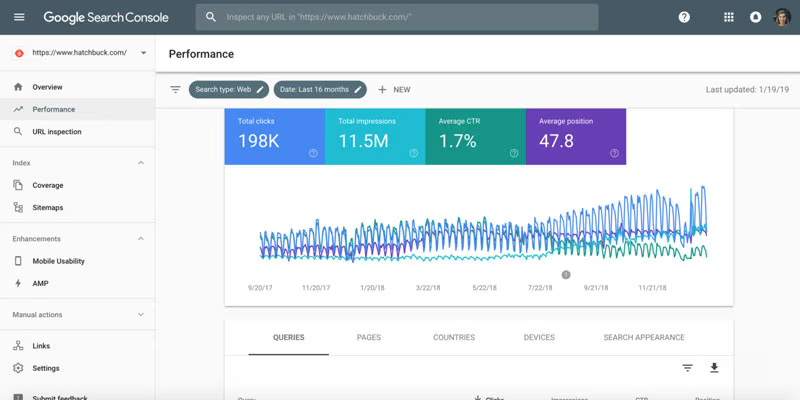
Best for: Every business with a website
You can’t talk about SEO without mentioning Google Search Console (GSC). It’s free, and it gives you direct insight into how your site performs on Google, straight from the source.
Google Search Console Key Features:
- Track clicks, impressions, CTR, and average position for search queries
- Identify crawl issues and indexation problems
- Submit sitemaps and request indexing of new webpages
- Discover which pages are being linked to externally
Pricing: Free
Why it works for small businesses: GSC is essential for monitoring your site’s health and visibility. While it doesn’t offer keyword suggestions or content tools, it’s a must-have data source to integrate with other platforms.
- Best used for: Technical SEO monitoring, indexing, performance tracking
- Ease of use: Easy to set up. Basic reports are easy to read, but deeper insights are better interpreted by an SEO agency.
2. Screaming Frog: Technical SEO Scanner
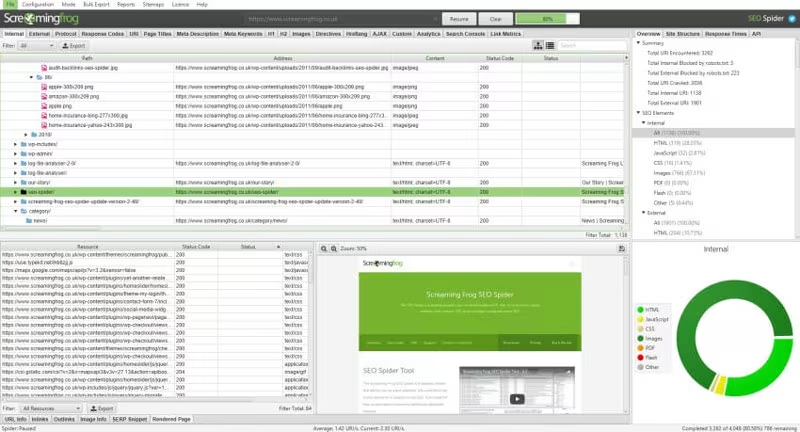
Best for: Web developers and technical SEOs
Screaming Frog is a desktop app that crawls your website like a search engine bot. It’s ideal for finding technical issues like broken links, redirect loops, and missing metadata.
Screaming Frog Key Features:
- Crawl analysis of up to 500 URLs for free
- Reports on title tags, H1s, meta descriptions, duplicate content
- Integration with Google Analytics and GSC
Pricing: Free for up to 500 pages; paid version at $279/year
Why it works for small businesses: It’s a powerful audit tool that gives control over technical health without the need for a developer agency.
- Best used for: In-depth technical SEO audits, broken link checks, metadata cleanup
- Ease of use: More advanced. Ideal for technical SEOs or web developers. Best used with an agency unless you’re tech-savvy.
3. PageSpeed Insights: Speed Meets Rankings
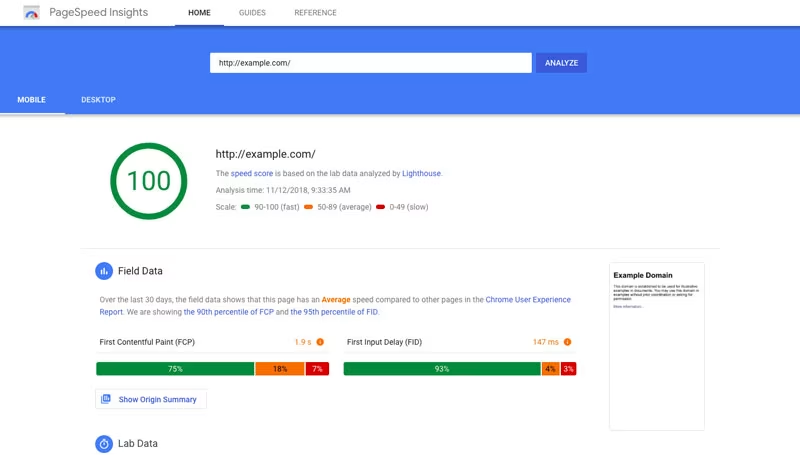
Best for: Measuring and improving site performance and Core Web Vitals
Google’s PageSpeed Insights analyzes your site’s loading times and user experience metrics across mobile and desktop. It gives you a performance score and actionable recommendations to improve speed, which is now a direct ranking factor.
PageSpeed Insights Key Features:
- Core Web Vitals analysis
- Mobile vs. desktop performance reports
- Suggestions for optimizing images, code, and server response
- Integration with Lighthouse for deeper audits
Pricing: Free
Why it works for small businesses: Fast sites rank higher and convert better. PageSpeed Insights helps you spot what’s slowing you down without hiring a developer first.
- Best used for: Technical SEO, performance optimization
- Ease of use: Beginner-friendly for basic insights; deeper fixes are best handled by an agency or developer.
4. Bing Webmaster Tools: Don’t Sleep on Bing
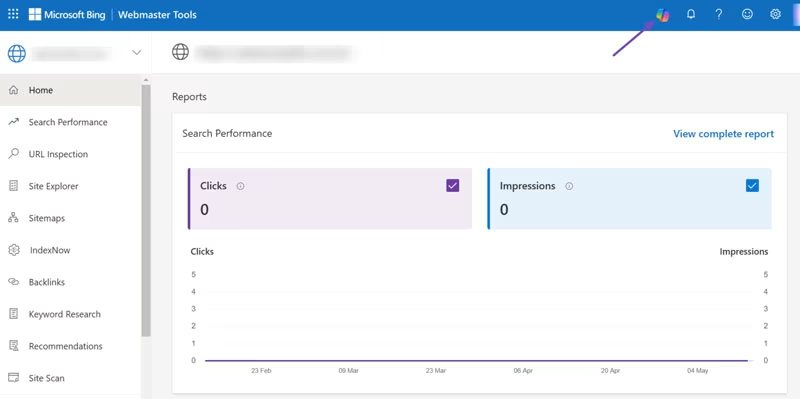
Best for: Capturing non-Google traffic and improving visibility across Microsoft platforms
Bing still powers millions of daily searches, especially on desktop and in older demographics. Bing Webmaster Tools gives you similar insights to Google Search Console but for the Bing ecosystem.
Bing Webmaster Tools Key Features:
- Keyword performance and backlink data
- URL inspection and indexation reporting
- SEO reports and diagnostic tools
- Integration with Microsoft Clarity for heatmaps and session replays
Pricing: Free
Why it works for small businesses: It’s an easy win especially if you’re targeting an audience that uses Microsoft Edge, Bing, or voice search on Windows.
- Best used for: Indexing, crawl diagnostics, Bing-specific keyword performance
- Ease of use: Beginner-friendly. Easy to set up and navigate. Great DIY tool for extra visibility
Best Content SEO Tools
Content is still king, but only if it’s optimized. These tools help you create pages and blog posts that align with search intent and outrank competitors.
5. Surfer SEO: Data-Driven Content Optimization
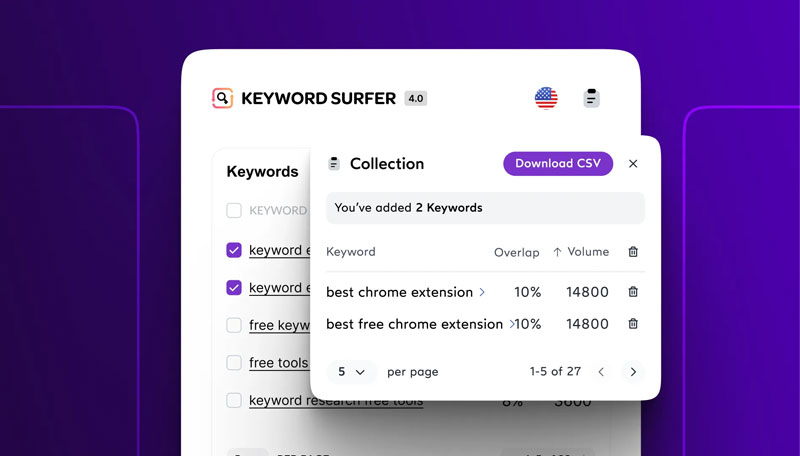
Best for: Content marketers focused on ranking blog posts and service pages
Surfer SEO helps optimize content based on SERP data, turning SEO from guesswork into a science. It analyzes top-performing pages for your target keyword and tells you what your content needs to include to compete.
Surfer SEO Key Features:
- Content Editor with real-time keyword usage and structure suggestions
- SERP Analyzer for competitive research
- AI content planning tools
Pricing: Starts at $99/month
Why it works for small businesses: Surfer helps small teams produce SEO-optimized content that ranks, without needing a full-time SEO strategist.
- Best used for: On-page content optimization, real-time keyword and structure suggestions
- Ease of use: Easy to use for writers. Great in-house tool for content teams. No deep SEO experience required.
6. Clearscope: Content That Ranks (Without the Guesswork)
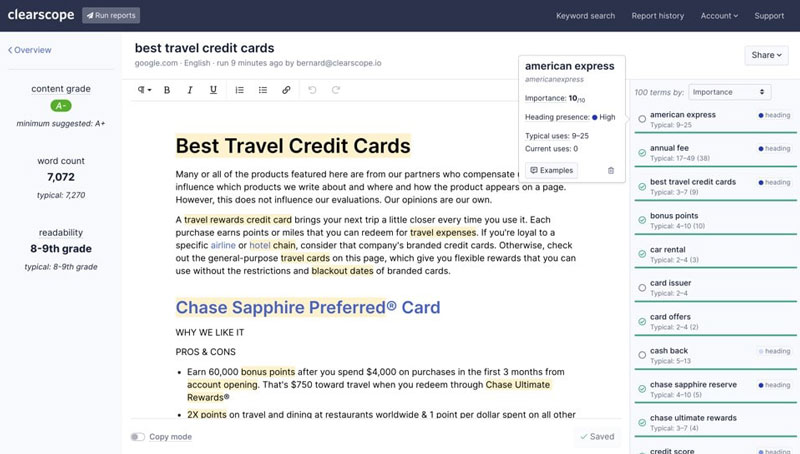
Best for: Creating high-quality, rankable content fast
Clearscope is a content optimization tool that helps you write articles that match what Google wants to see. It grades your content against the top-ranking pages for a keyword and tells you exactly what topics and terms to include.
Clearscope Key Features:
- Content grading and keyword suggestions
- Competitive content reports
- Google Docs and WordPress integrations
Pricing: Starts at $189/month
Why it works for small businesses: It takes the mystery out of content creation, making it easy to write content that actually performs in search.
- Best used for: Content optimization based on what’s ranking, semantic keyword inclusion.
- Ease of use: Very easy for writers. Minimal SEO knowledge required. Works best for content marketers and in-house teams.
7. Yoast SEO: WordPress SEO Made Simple
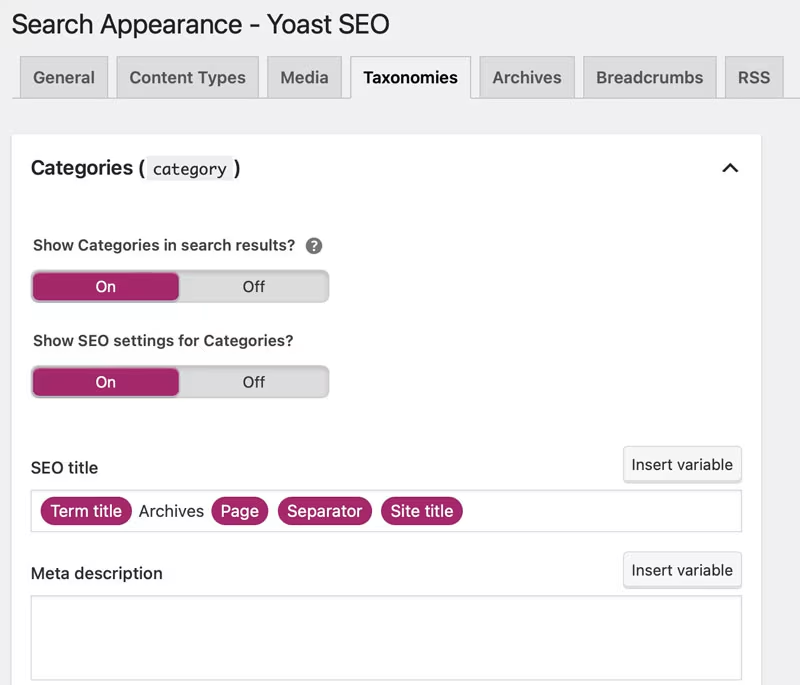
Best for: WordPress users who want on-page SEO guidance
Yoast is one of the most popular SEO plugins for WordPress, and for good reason. It simplifies the technical side of SEO with easy-to-follow suggestions right inside your content editor.
Yoast SEO Key Features:
- On-page SEO checks (meta tags, readability, structure)
- Schema markup and breadcrumbs
- XML sitemap generation
- Social media previews
Pricing: Free; Premium starts at $118.80/year
Why it works for small businesses: It’s like having an SEO coach built into your website. Perfect for teams with no in-house SEO experience.
- Best used for: On-page SEO for WordPress (meta titles, schema, readability, etc.)
- Ease of use: Beginner-friendly. Ideal for small businesses managing their own WordPress site.
8. Rank Math: A Smarter WordPress SEO Plugin
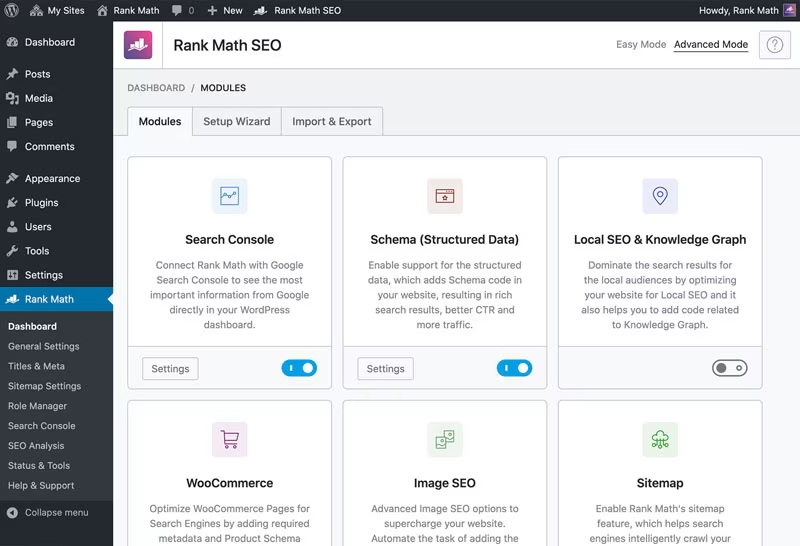
Best for: WordPress sites that need more features than Yoast (for free)
Rank Math is an SEO plugin that’s giving Yoast a run for its money. It’s packed with features and most of them are free. You get more control, more insights, and tighter integration with tools like GSC and GA4.
Rank Math Key Features:
- Advanced schema, rich snippets, and keyword tracking
- Automated image SEO and redirection manager
- Modular setup (turn features on/off)
- Real-time SEO scoring
Pricing: Free; Pro starts at $7.99/month
Why it works for small businesses: You get premium-level SEO control without paying premium prices. Especially great for WooCommerce sites or multi-author blogs.
- Best for: Advanced WordPress SEO; schema, keyword tracking, automation
- Ease of use: Slightly more advanced than Yoast. Still manageable for DIY use, but agencies can unlock more value.
Best Keyword Research & Competitive Analysis Tools
These are your market intelligence weapons. They tell you what keywords to target, what competitors are doing, and where the opportunities are.
9. Ahrefs: All-in-One Powerhouse for Growing Businesses
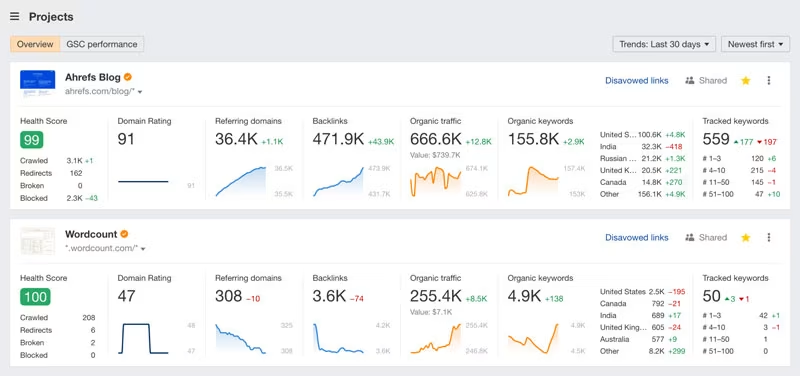
Best for: Agencies, freelancers, and small teams ready to scale SEO efforts
Ahrefs remains one of the most robust and comprehensive SEO platforms available in 2025. While it comes at a premium, the data insights it offers are unmatched, especially for backlink analysis and competitive research.
Ahrefs Key Features:
- Site Explorer for checking competitors’ traffic and backlink profiles
- Keyword Explorer with clickstream data for realistic traffic estimates
- Site Audit tool that scans your website for technical issues
- Rank Tracker to monitor keyword positions over time
Pricing: Starts at $129/month
Why it works for small businesses: If you’re serious about content marketing, backlink strategies, or outperforming competitors, Ahrefs is an investment that pays dividends.
- Best used for: Backlink analysis, keyword research, competitor research, and content gap analysis
- Ease of use: Moderate learning curve; not beginner-focused. Best used by marketers or agencies who understand SEO data.
10. SEMrush: The Marketing Swiss Army Knife
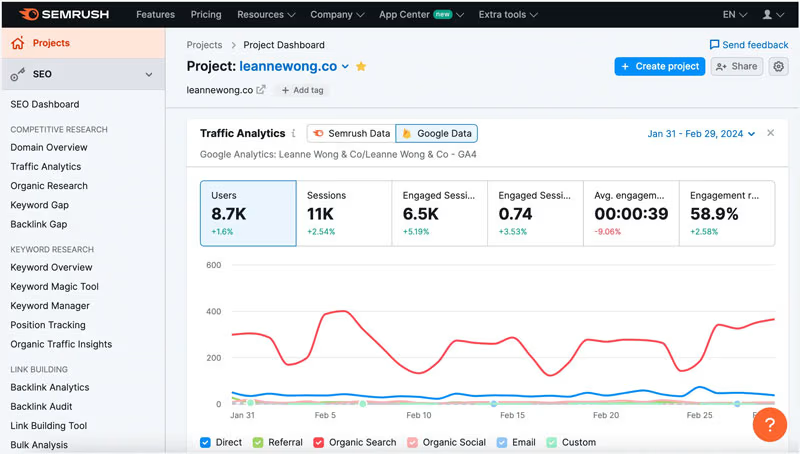
Best for: Businesses requiring all-in-one SEO, PPC, and content marketing campaigns
SEMrush is a powerful platform that goes beyond SEO offering tools for PPC, social media, content marketing, and competitor research. It’s ideal for small to mid-sized businesses looking to centralize all their marketing insights in one dashboard.
SEMRush Key Features:
- Domain overview and competitor tracking
- Keyword Magic Tool for deep keyword research
- Site Audit and backlink gap analysis
- Position tracking for specific locations or devices
Pricing: Starts at $139.95/month
Why it works for small businesses: It’s an all-rounder. Whether you’re running a blog, Google Ads campaign, or content strategy, SEMrush covers it all under one roof.
- Best used for: All-in-one campaigns, SEO, PPC, competitor tracking, content audits
- Ease of use: Moderate to advanced. Can feel overwhelming without prior SEO knowledge. Best used with an agency or trained marketer.
11. Mangools: Sleek, Simple, and Effective
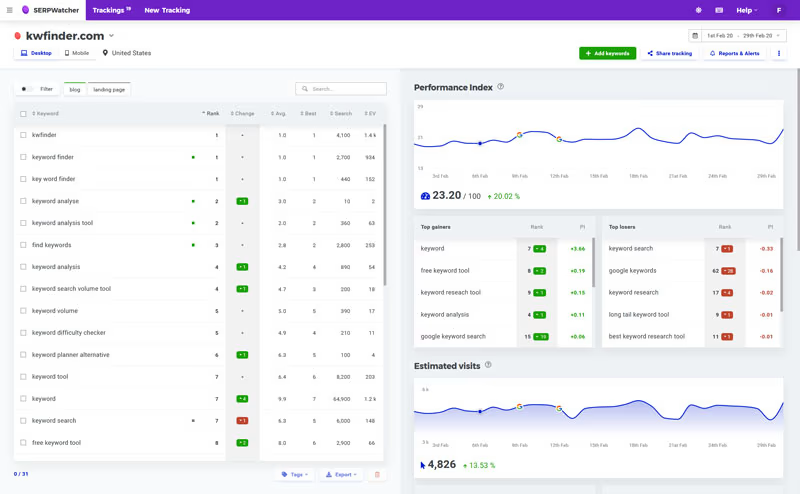
Best for: Small teams who want intuitive, beautiful SEO tools
Mangools bundles 5 tools (KWFinder, SERPChecker, LinkMiner, SiteProfiler, SERPWatcher) into one simple suite. It’s user-friendly and surprisingly powerful for its price.
Mangools Key Features:
- Keyword research with search volume and difficulty
- SERP analysis with backlink data
- Local Business SEO support
- Rank tracking and site profiling
Pricing: Starts at $24.50/month
Why it works for small businesses: It’s SEO without the overwhelm. Mangools is clean, clear, and perfect for teams who want results without the learning curve.
- Best used for: Keyword research, local SEO, SERP analysis
- Ease of use: Extremely intuitive. Great for small teams doing in-house SEO with minimal training.
12. Ubersuggest: Budget-Friendly & Beginner-Friendly
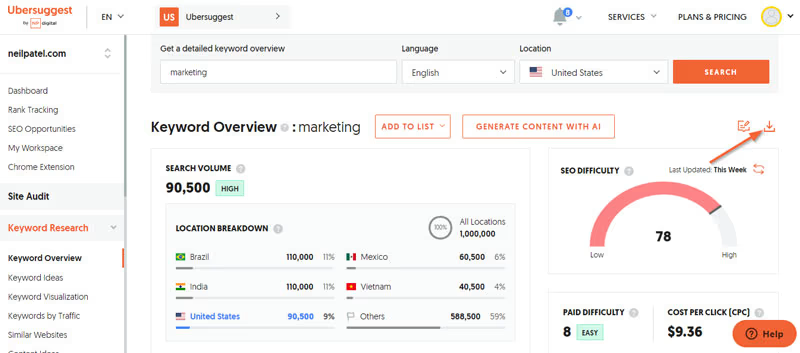
Best for: Entrepreneurs and small teams just getting started with SEO
Ubersuggest by Neil Patel has grown into a surprisingly powerful tool that balances usability and affordability. It covers the basics extremely well; perfect for startups and solo business owners.
Ubersuggest Key Features:
- Keyword research with search volume, competition score, and CPC
- Basic backlink analysis
- SEO audit reports
- AI writing assistance for content outlines
- Integration with AnswerThePublic
Pricing: Starts at $12/month or lifetime deals available
Why it works for small businesses: Ubersuggest gives you a taste of what the big tools offer, but at a fraction of the price. Great for bootstrapped teams.
- Best used for: Basic keyword research, simple content ideas, light SEO audits
- Ease of use: Very beginner-friendly. Ideal for solo founders and small teams doing SEO themselves.
13. AnswerThePublic: Discover What Your Audience Is Asking
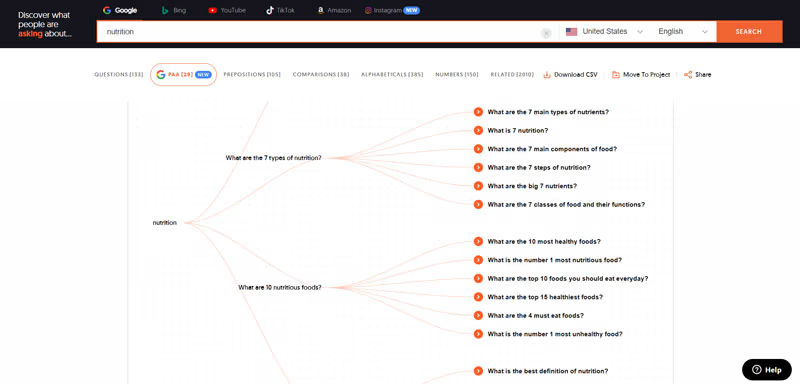
Best for: Content ideation and long-tail keyword discovery
AnswerThePublic visualizes search questions, comparisons, and phrases in an intuitive format. It pulls auto-suggest data directly from search engines.
AnswerThePublic Key Features:
- Discover question-based keywords
- Export keyword clusters for content planning
- Integrates with Ubersuggest
Pricing: Free with limited searches; Pro starts at $6/month
Why it works for small businesses: Great for developing blog ideas, FAQ pages, and SEO-focused content that matches user intent.
- Best used for: Content ideation, discovering long-tail and question-based keywords
- Ease of use: Super beginner-friendly. Perfect for blog writers, content creators, and solo marketers.
14. Moz Pro: Veteran SEO with a Modern Interface
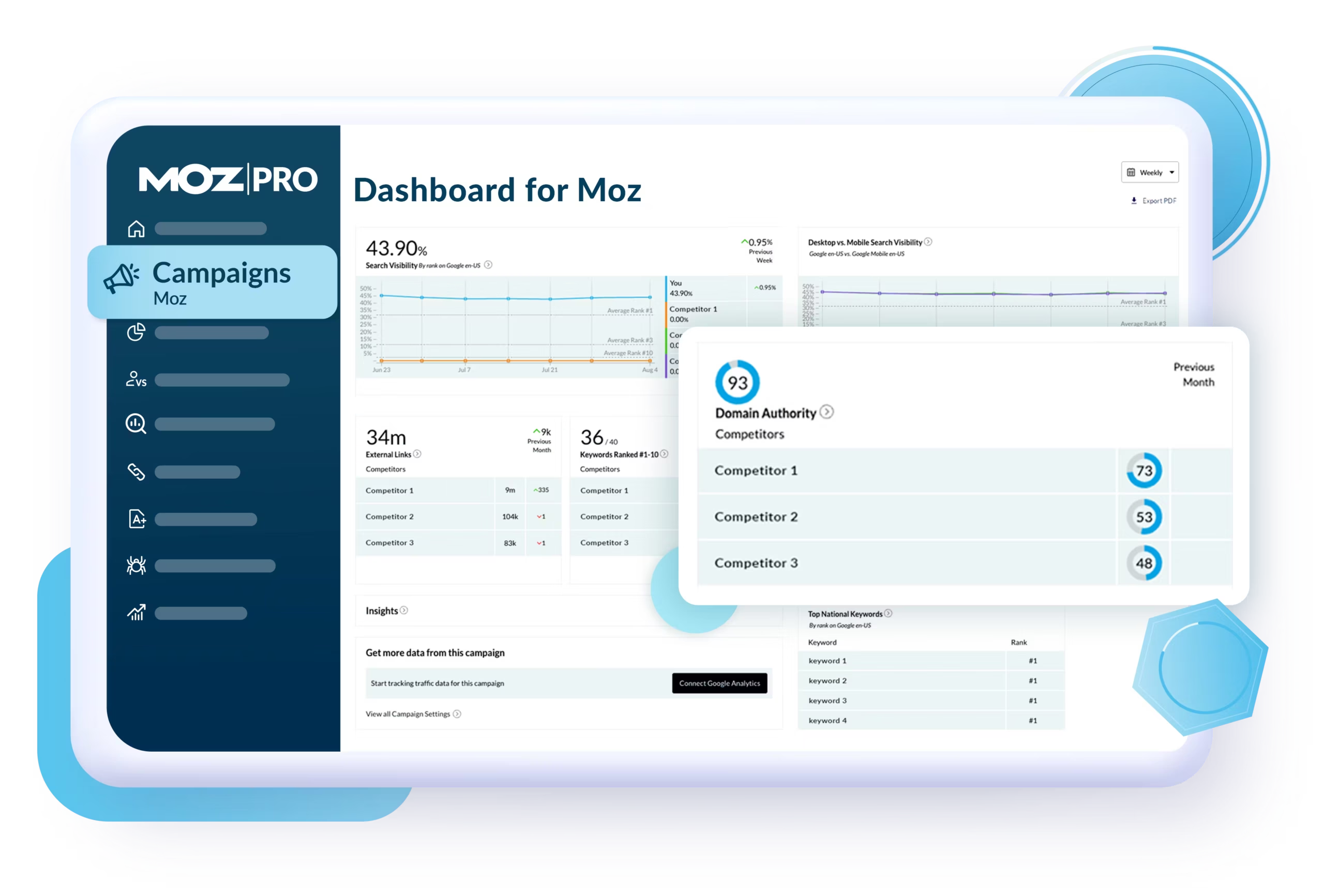
Best for: Businesses wanting reliable data and support
Moz Pro has been around for years, but it’s still one of the most trusted SEO platforms. It offers a solid blend of keyword research, site auditing, link tracking, and rank monitoring all in a tidy UI.
Moz Pro Key Features:
- Keyword Explorer and Link Explorer
- Site Crawl diagnostics
- Page optimization suggestions
- Custom reporting
Pricing: Starts at $49/month
Why it works for small businesses: Moz’s training and support are top-notch. If you’re new to SEO or want expert guidance along the way, it’s a reliable choice.
- Best used for: Keyword and link tracking, SEO site audits, rank monitoring
- Ease of use: Mid-level. Easy to onboard, with helpful tutorials. Better results when paired with strategic guidance from an SEO expert or agency.
15. Majestic SEO: Backlink Intelligence at Its Finest
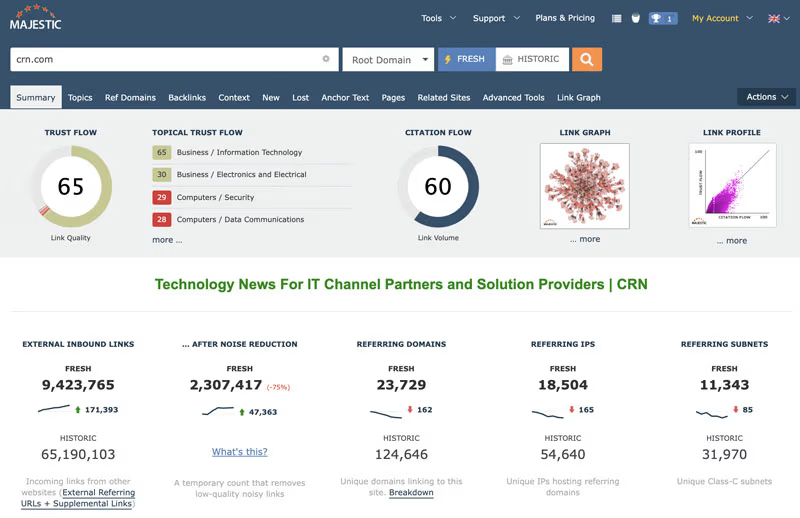
Best for: Businesses focusing on link-building and backlink profile analysis
Majestic SEO is a specialized tool built almost entirely around backlink data. It’s one of the most comprehensive backlink crawlers available, making it perfect for businesses that want to understand their link profile or build authority through quality links.
Majestic SEO Key Features:
- Huge backlink index with fresh and historic data
- Trust Flow and Citation Flow metrics to gauge link quality
- Site Explorer for competitor backlink research
- Bulk backlink checker and link context analysis
Pricing: Free tools available
Why it works for small businesses: Links are still one of Google’s top ranking factors. Majestic shows you exactly who’s linking to you, which links are helping or hurting, and where to find new opportunities.
- Best used for: Backlink analysis, link-building strategies
- Ease of use: Moderate. The interface is straightforward, but understanding link metrics takes some SEO experience. Agencies can extract more value from the data.
Best Analytics & Reporting Tools
If you can’t measure it, you can’t grow it. These tools track your progress and show what’s working (and what isn’t).
16. Google Analytics 4 (GA4): Insight Into What Really Works
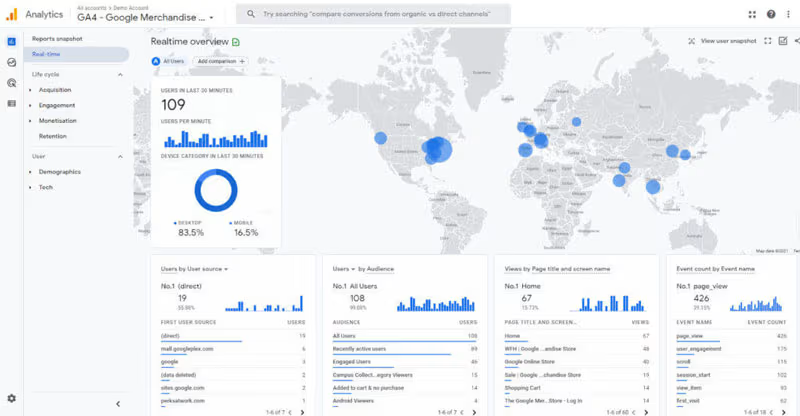
Best for: Businesses that want to understand user behavior and website performance
GA4 is the latest version of Google Analytics, built to give you a deeper look at how users interact with your website or app. It goes beyond pageviews to focus on engagement, conversion paths, and user journeys.
GA4 Key Features:
- Tracks events, not just sessions or pageviews
- Deeper audience segmentation and lifecycle tracking
- Integration with Google Ads, GSC, and BigQuery
- Real-time data and predictive metrics
Pricing: Free
Why it works for small businesses: It helps you figure out what’s working (and what’s not), where traffic is coming from, and which pages are converting all in one place.
- Best for: Reporting, user behaviour tracking, audience insights
- Ease of use: Interface takes getting used to. Surface-level insights are accessible, but custom events and reports are better handled by pros.
17. Looker Studio: SEO Reporting on Steroids
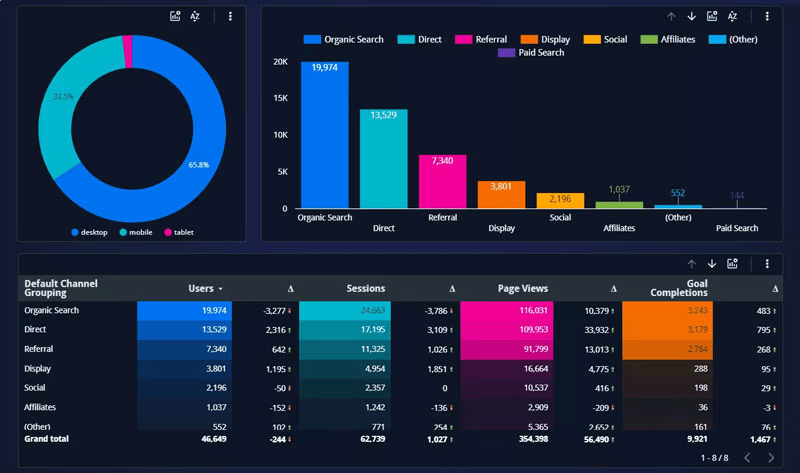
Best for: Advanced SEO reporting and data visualization
Formerly Google Data Studio, Looker Studio lets you connect multiple data sources (GA4, GSC, Ahrefs, etc.) into one dynamic dashboard. It’s a powerful tool for tracking SEO performance over time.
Looker Studio Key Features:
- Customizable SEO dashboards
- Integration with most analytics and SEO tools
- Real-time performance tracking
- Shareable and automated reporting
Pricing: Free
Why it works for small businesses: It consolidates all your SEO data in one visual report, making it easy to see trends and ROI.
- Best used for: Reporting, client SEO dashboards
- Ease of use: Moderate. Takes some setup; agencies can build professional dashboards quickly.
18. SE Ranking: Affordable All-in-One Alternative
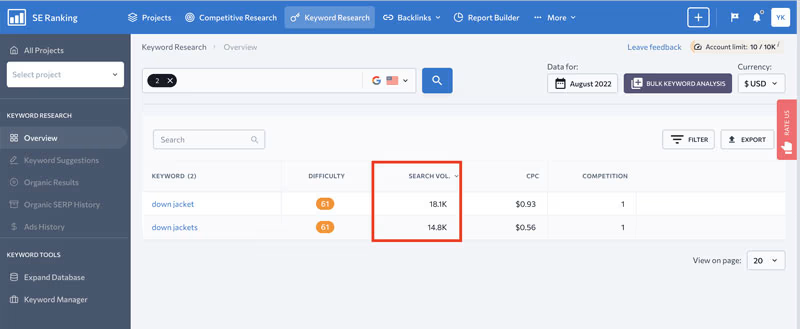
Best for: Agencies managing multiple clients or campaigns
SE Ranking offers an all-in-one platform similar to Ahrefs but at a more affordable price point. It includes rank tracking, keyword research, competitor analysis, and website audits.
SE Ranking Key Features:
- Keyword and competitor tracking
- White-label reporting
- Page change monitoring (great for agencies)
- Local SEO tools
Pricing: Starts at $65/month
Why it works for small businesses: It scales well as your needs grow. Great for in-house marketers or freelancers managing multiple clients.
- Best used for: Keyword tracking, competitor monitoring, white-label reports
- Ease of use: Designed for agencies and marketers. Easier than Ahrefs or SEMrush but still benefits from experience.
Best Content Ideation & Link-Building Tools
Traffic comes from content that earns links and shares. These tools help you discover trends and attract backlinks.
19. ChatGPT + SEO Plugins: AI Meets Optimization

Best for: Marketers who want to blend AI with SEO workflows
With plugins like “SEO Core AI,” ChatGPT can now help identify keyword clusters, rewrite meta descriptions, and simulate SEO-friendly copywriting.
ChatGPT Key Features:
- AI-powered content generation and rewriting
- Keyword cluster analysis
- Meta title suggestions
Pricing: ChatGPT Plus ($20/month) + plugin access
Why it works for small businesses: Combines SEO strategy and content execution in one workflow, saving time and cost.
- Best used for: Content creation, meta tag generation, keyword clustering, rewriting for SEO
- Ease of use: Very user-friendly if you’re already familiar with ChatGPT. Great for DIY use or agency workflows.
20. BuzzSumo: Content Research & Trendspotting
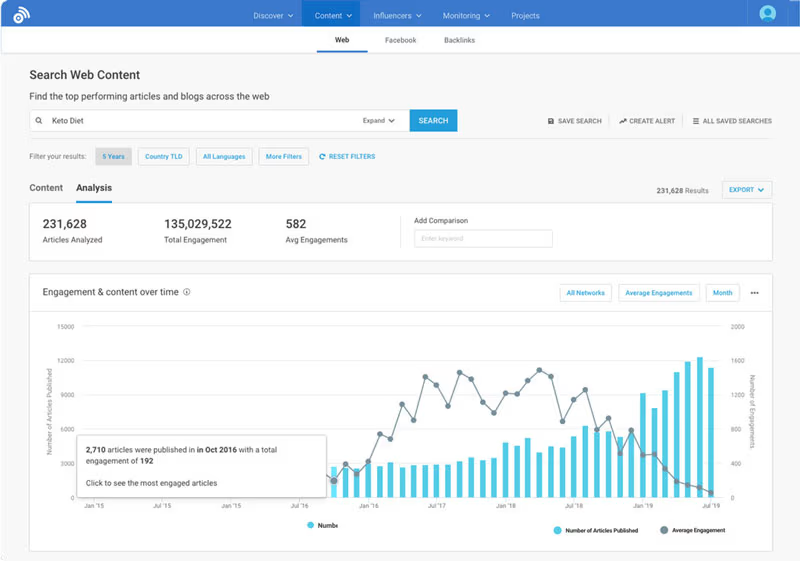
Best for: Finding share-worthy content and influencer collaboration
BuzzSumo helps you discover the most shared and linked-to content on the web. Whether you’re building backlinks, creating a new blog post, or finding influencers, this is your go-to tool.
BuzzSumo Key Features:
- Trending content and topic discovery
- Backlink and influencer outreach tools
- Competitor content analysis
Pricing: Free trial available; paid starts at $199/month
Why it works for small businesses: It shows you what kind of content your audience already loves, helping you create posts that get attention, links, and traffic.
- Best used for: Content trend discovery, backlink opportunities, influencer outreach
- Ease of use: Easy to navigate. Great for content teams and PR pros. No SEO background needed
Best Free SEO Tools
You don’t need a big budget to get started with SEO. In fact, some of the most powerful insights can come from completely free tools, including “lite” versions of premium platforms. These are perfect for small businesses that want to start optimizing without committing to a monthly subscription.
Here are some of the best free SEO tools you can use right now:
21. Google Trends
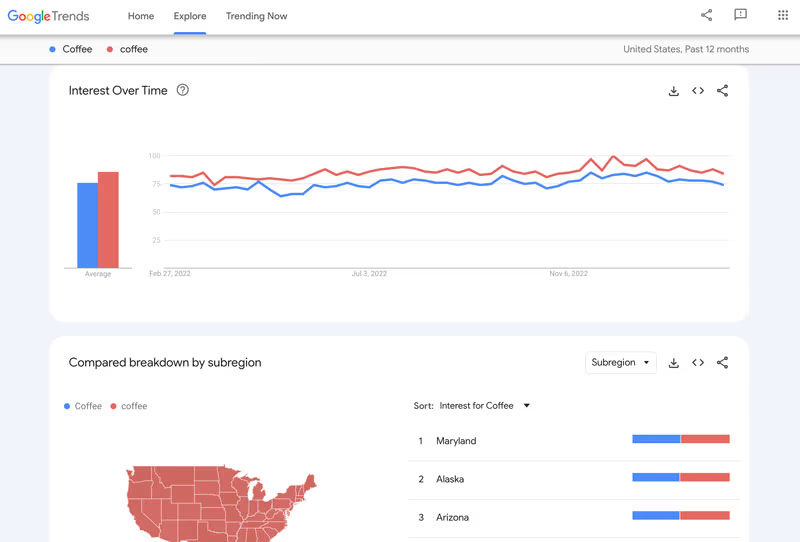
Best for: Tracking keyword popularity over time and spotting seasonal trends
Google Trends lets you see how search interest for a keyword changes over time. You can compare multiple terms, filter by region, and spot rising topics before they peak.
Google Trends Key Features:
- Search interest data over time
- Regional and category filtering
- Compare multiple keywords at once
- Shows related trending searches
Pricing: Free
Why it works for small businesses: Perfect for aligning content or product launches with when interest is highest, boosting your chances of ranking and engagement.
- Best used for: Seasonal keyword targeting, trend analysis
- Ease of use: Extremely beginner-friendly; no login required.
22. Exploding Topics
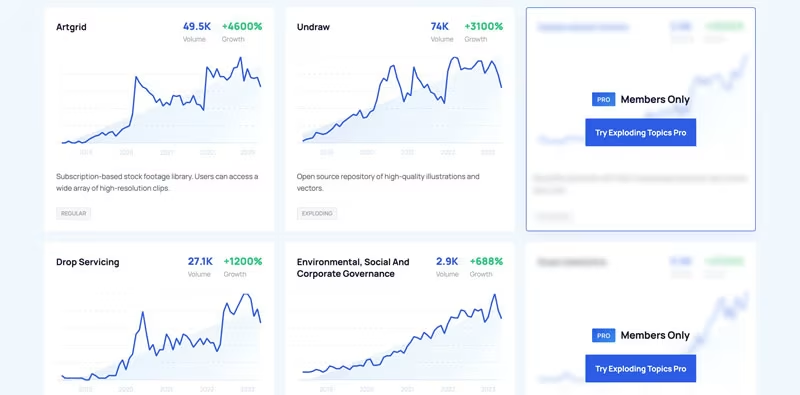
Best for: Finding trending topics before they become mainstream
Exploding Topics scans the internet for fast-growing keywords, topics, and industries, giving you early insights into what’s about to take off.
Exploding Topics Key Features:
- Identifies keywords and topics with rapid growth
- Organized by categories and industries
- Historical trend graphs for each topic
- Weekly trend updates
Pricing: Free trial available; Pro starts at $39/month
Why it works for small businesses: Lets you create content, products, or campaigns around trends before your competitors even know they exist.
- Best used for: Early trend discovery, content planning
- Ease of use: Beginner-friendly; insights are clearly visualized.
23. Detailed SEO Extension
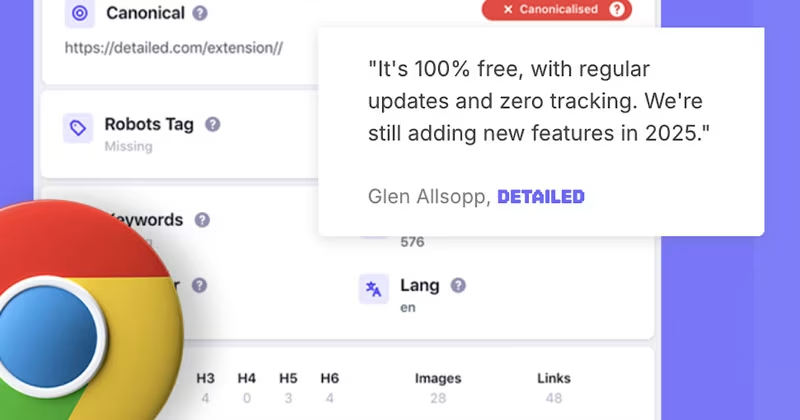
Best for: Quick on-page SEO checks directly in your browser
Detailed SEO Extension provides instant SEO insights for any webpage you visit. See meta tags, headings, internal links, schema, and more without leaving your browser.
Detailed SEO Key Features:
- View meta titles, descriptions, and headings
- Check internal and external links
- Inspect schema markup and canonical tags
- Works instantly on any page you visit
Pricing: Free
Why it works for small businesses: Saves time by giving you quick, on-the-spot SEO audits without running a full crawl.
- Best used for: On-page SEO checks, competitor site analysis
- Ease of use: Very beginner-friendly; install and click.
24. SEOgets
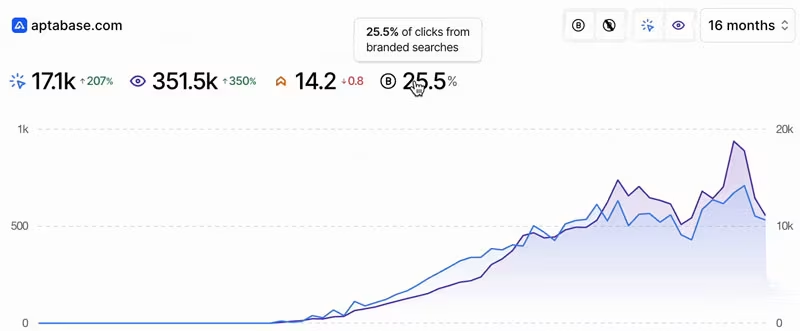
Best for: Generating keyword ideas and analyzing search trends
SEOgets is a free keyword research tool that pulls keyword suggestions from Google’s autocomplete data. It’s lightweight, fast, and great for brainstorming content ideas.
SEOgets Key Features:
- Pulls keyword ideas from Google’s autocomplete tool
- Organizes suggestions alphabetically or by popularity
- Supports multiple languages and regions
- Simple, easy interface
Pricing: Free
Why it works for small businesses: Ideal for quickly building keyword lists without signing up for a premium SEO suite.
- Best used for: Keyword brainstorming, long-tail keyword discovery
- Ease of use: Beginner-friendly; no login required.
25. Majestic Free Tools
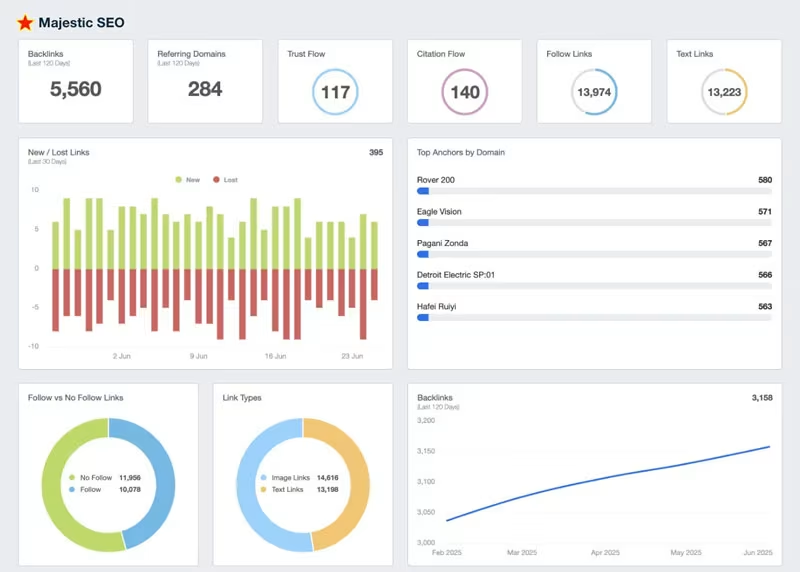
Best for: Basic backlink analysis and Trust Flow/Citation Flow metrics
Majestic’s free tools let you see a limited view of a domain’s backlinks, including their Trust Flow and Citation Flow scores — unique metrics for link quality and authority.
Majestic SEO Key Features:
- Access to Majestic’s Fresh Index
- Trust Flow and Citation Flow scores
- Limited backlink data for any domain
Pricing: Free tier available with registration
Why it works for small businesses: Gives you an introduction to Majestic’s powerful link database, helping you understand your backlink profile at zero cost.
- Best used for: Backlink quality checks and competitor link scouting
- Ease of use: Straightforward interface. Full value requires understanding link metrics; agencies can dig deeper.
26. WebPageTest
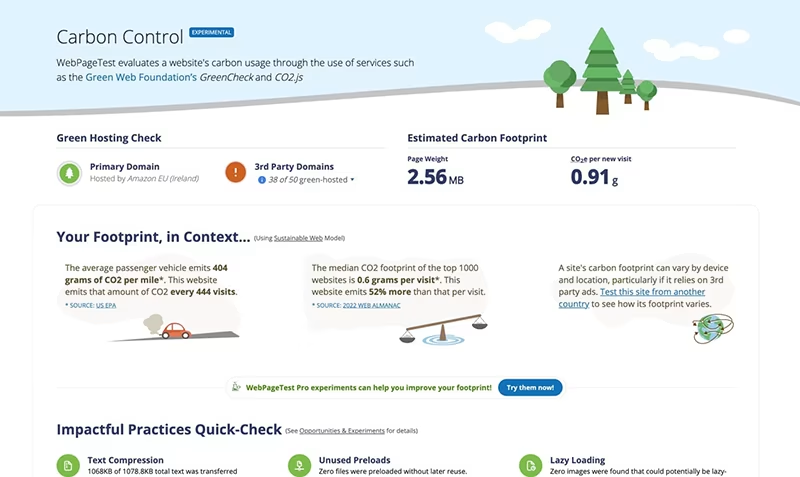
Best for: Advanced website performance testing and diagnostics
WebPageTest provides in-depth speed and performance reports for your website, including detailed breakdowns of load times, Core Web Vitals, and resource usage. It’s a go-to tool for pinpointing what’s slowing down your site.
WebPageTest Key Features:
- Core Web Vitals and speed index analysis
- Waterfall view of every resource loaded
- Test from multiple locations and devices
- Detailed performance grades and suggestions
Pricing: Free (Pro version available for advanced features)
Why it works for small businesses: Gives you actionable, developer-level insights without needing paid speed testing tools, helping you improve rankings and user experience.
- Best used for: Technical SEO, site speed optimization
- Ease of use: Moderate. It’s easy to run tests, but interpreting advanced results is easier with an SEO or developer’s help.
Should You Start with Free Tools?
Free SEO tools are a great way to learn the ropes, gather initial insights, and fix glaring issues without risk. They won’t give you the full picture that premium platforms do, but they can absolutely move the needle for small businesses starting out.
Why Going DIY Has Its Limits, And When an SEO Agency Is Your Best Bet
There’s no denying it, SEO tools make it seem like anyone can manage search engine optimization on their own. We’ve seen it with businesses across various industries, from real estate agents to sole proprietorships and businesses looking to sell products.
With platforms like Ubersuggest, Ahrefs, and Surfer AI offering dashboards, data, and audits at your fingertips, small businesses often start by handling SEO in-house.
And that’s not a bad thing, in fact we encourage getting hands-on with the basics. But if you want to rank competitively, sustainably, and fast, there’s a key truth worth acknowledging: Tools can help you do SEO, but they can’t help you win at SEO.
That’s where an experienced SEO agency like Creativeform comes in.
Strategy beats software
Even the best tools can’t replace human strategy. SEO success doesn’t come from ticking boxes on a checklist, it comes from:
- Understanding your market and search intent
- Creating content that connects and converts
- Optimising your site structure, UX, and technical health
- Executing ongoing link-building, performance tracking, and refinement
This requires time, experimentation, and a deep understanding of how Google (and your audience) thinks.
At Creativeform, we bring this strategy to life with every campaign. Our clients aren’t just ranking, they’re growing. One recent client saw a 400% increase in organic traffic, while another saw a 600% increase in organic traffic and sales from SEO‑driven content.
Save time and skip the guesswork
Most small business owners wear too many hats. Running marketing, sales, operations and trying to understand algorithm updates, Core Web Vitals, and keyword cannibalisation? That’s a recipe for burnout.
Working with an agency means:
- You reclaim time to focus on your core business
- You avoid costly mistakes like duplicate content, broken redirects, or wasted ad spend
- You gain a team that’s constantly testing, learning, and adapting your strategy to new search trends
When you partner with an agency that has a proven track record, you’re not just paying for effort, you’re investing in outcomes.
SEO is an investment, and like any good one, it should deliver a clear return:
- More visibility
- Higher-quality traffic
- Better conversions
With Creativeform, we use tools, yes, but they’re the starting line, not the finish. We combine data with human insight, creativity with optimization, and performance with storytelling. The result? SEO campaigns that actually move the needle.
So if you’re feeling overwhelmed by the tools, or simply ready to stop guessing and start growing, we’re here to help.

